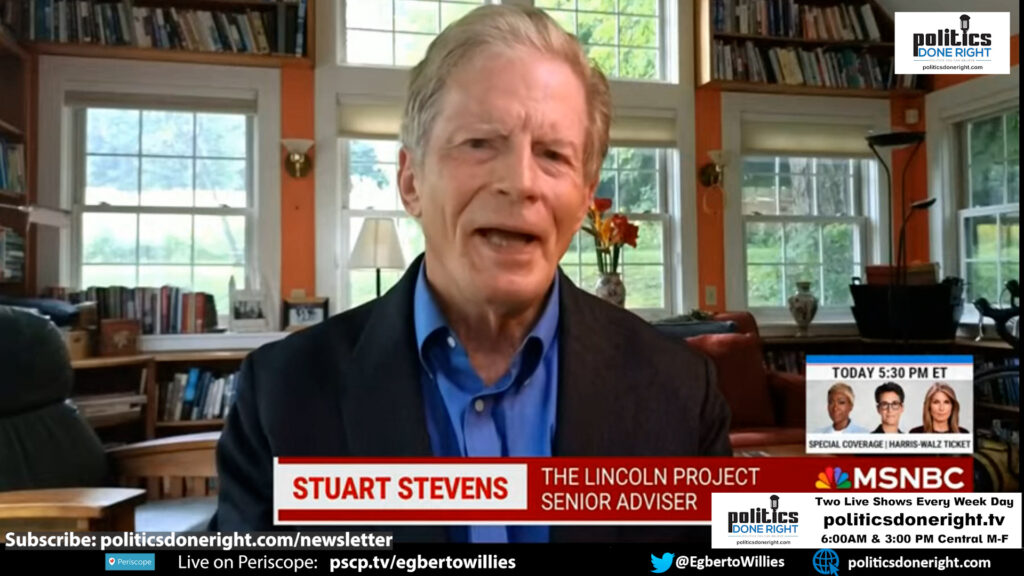The Lincoln Project Senior Advisor Stuart Stevens nails it. Using the liberal trope will fail specifically because while the policies of Kamala Harris and Tim Walz are popular, Trump and the Republicans offer nothing for the working class.
GOP Liberal attack on Tim Walz will fail.
Podcasts (Video — Audio)
The recent announcement of Minnesota Governor Tim Walz as Vice Presidential candidate Kamala Harris’s running mate has sparked significant discussion and analysis among political commentators. One particular comment from a Lincoln Project advisor, Stuart Stevens, captures the essence of the GOP’s struggle: they have nothing to offer. This critique not only highlights the inadequacies of the Republican platform but also underscores the strategic foresight behind Harris’s choice of running mate.
Tim Walz is a seasoned politician known for his pragmatic, progressive approach. His selection signals a commitment to policies that resonate with most Americans, even those who might not explicitly identify as progressive. The advisor’s observation on MSNBC reinforces this point, suggesting that Harris’s choice is unifying and strategic. It brings together a coalition of voters who support progressive healthcare, education, and economic equality policies without necessarily labeling themselves as progressives.
The GOP, on the other hand, seems stuck in a rhetorical rut. Their strategy of branding opponents as “liberal” and “radical” is increasingly outdated and ineffective. In a rapidly changing America, voters are more concerned with tangible policies and real-world outcomes than ideological labels. The advisor noted that the Trump campaign’s language is reminiscent of campaigns from the late 80s and 90s when fearmongering about liberal policies had more traction. Today, such tactics seem hollow and out of touch with the electorate’s needs and concerns.
The crux of the Republican Party’s problem, as highlighted in the discussion, is the absence of a coherent policy platform. What do Republicans offer voters? In stark contrast to the detailed agendas of the Biden and Harris-Walz campaigns, the GOP lacks a clear, constructive vision for the future. Instead, they rely on attacks and scare tactics without presenting a viable alternative. The advisor poignantly asks: “What is the bargain they’re striking with voters?” The answer appears to be nothing substantial.
This lack of a positive agenda leaves the GOP vulnerable. They can no longer rely on demonizing the opposition as their sole strategy. The advisor points out that Republican attacks amount to little more than “your mama” insults, devoid of substantive policy debate. This is particularly glaring compared to the Harris-Walz campaign, which promises concrete benefits like child care, family leave, and healthcare. These are issues that matter deeply to voters, especially those at the lower end of the economic spectrum.
The economic and social disparities between red and blue states further exacerbate the GOP’s credibility problem. Red states consistently lag in critical metrics such as healthcare, education, and economic prosperity. They are often subsidized by the wealthier, more progressive blue states. This stark reality undermines the GOP’s claims of effective governance. The advisor’s commentary drives home the point: what do voters gain from electing Republican politicians? The answer, again, is dishearteningly little.
In contrast, the Harris-Walz ticket offers a vision of inclusive prosperity and social justice. Their platform is designed to lift the working class and ensure everyone can access essential services. This stands in sharp contrast to the GOP’s alignment with plutocratic interests, which prioritize corporate profits over public well-being. Trump’s quid-pro-quo approach to governance, where policy decisions seem to be influenced by financial contributions, further tarnishes the GOP’s appeal.
The progressive agenda, as embodied by Harris and Walz, promises to maintain and expand critical social programs. This includes addressing climate change, enhancing public education, and ensuring healthcare for all. These policies resonate with most Americans, who, as the advisor notes, often support progressive initiatives even if they don’t explicitly identify with the progressive label.
The Republican Party’s reliance on outdated rhetoric and lack of substantive policy proposals leave them ill-equipped to counter the Harris-Walz ticket. The Lincoln Project advisor’s insights underscore the GOP’s strategic and ideological bankruptcy. In contrast, the Harris-Walz campaign offers a compelling, progressive vision for America’s future, grounded in policies that directly address the needs and aspirations of the American people. This contrast sets the stage for a potentially decisive victory in November, where the message of inclusive progress and social equity will likely prevail.

